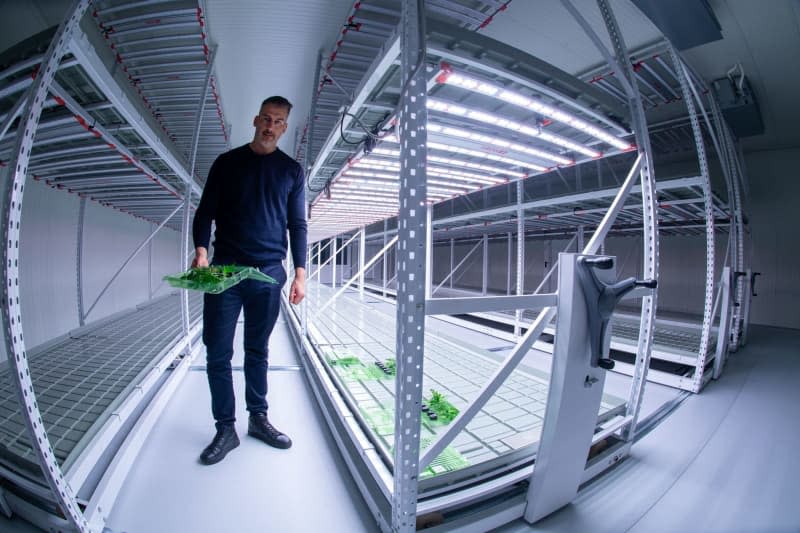On a former East German military site, where the communist state’s National People’s Army (NVA) once stored vast amounts of military equipment, tiny cannabis plants now take root.
The plants, imported from Austria, could grow over 1 metre tall under the right conditions, explains Christian Tonn, founder of the German Cultivation Association (DAG).
After eight to 10 weeks, they are ready for harvest.
Tonn and his team aim to create the perfect environment for cannabis growers across Germany, with a new facility on a former site used by the East German armed forces in Relzow, a village in Germany’s northern Mecklenburg-Vorpommern state.
Concrete paths run between numerous halls, which once housed tanks and other military equipment.
Tonn explains that the site’s 36 hangars, covering 120,000 square metres, are now being transformed for cannabis cultivation. Thirteen of these halls, totalling 40,000 square metres, are already secured.
In the past few months, the space has been fitted with high-tech equipment, including special LED lights, multi-storey shelves with precise angles for water drainage, and a computer-controlled irrigation, climate and nutrient system — making up the first cultivation module.
The 230-square-metre module includes rooms for various purposes such as cultivation, drying and processing, along with an electronic security system and disinfection lock.
In line with Germany’s new partial legalization of cannabis, non-commercial cultivation associations with up to 500 members are now allowed to grow and distribute cannabis to their members.
Germany loosened rules on personal cannabis consumption in a law passed early this year.
Since April 1, in the first change to go into effect, adults have been allowed to carry up to 25 grams of marijuana, while up to three plants can be cultivated at home.
Since July 1, marijuana enthusiasts have been legally allowed to establish the so-called cannabis clubs.
DAG’s aim is to provide these groups with the technology to cultivate high-quality cannabis at a cost of around €2 ($2.1) per gram, which is significantly lower than black market prices, Tonn says.
DAG plans to offer advanced management software that allows modules to be monitored and controlled remotely.
The Relzow facility is equipped with comprehensive security measures, including a fenced-in area under constant surveillance. To date, DAG states that it has invested over €1 million in the project.
“We have received many enquiries from associations all over the country,” says Tonn. The first association from another German state is expected to start in Relzow in early 2025.
However, some challenges loom.
Many cannabis clubs are currently still dealing with their authorization procedures. Furthermore, the state Ministry of the Environment and Agriculture has expressed concerns about large-scale operations such as DAG’s.
According to the agriculture authority, a permit must be refused if associations cultivate in a common building, building complex or in close proximity to each other.
The goal is small-scale, non-commercial cultivation for personal use as opposed to large-scale operations, aiming to avoid over-concentration of cultivation areas.
But Tonn remains undeterred, emphasizing that discussions and site visits with politicians are planned in the near future. Each association in Relzow operates its own separate module with exclusive access.
Additionally, DAG’s business model offers flexibility, enabling associations not only to rent space in Relzow but “the module has been designed so that we can set it up practically anywhere,” he adds.
According to Tonn, DAG plans to invest in research, particularly into cannabis growing techniques in Germany, in collaboration with a nearby university.


H/T: www.yahoo.com



